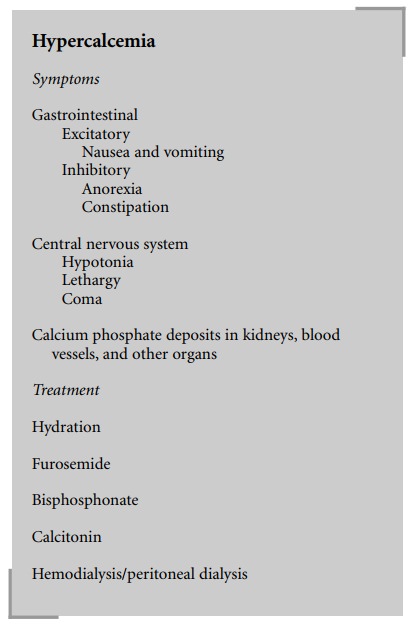Chapter: Clinical Cases in Anesthesia : Calcium Metabolism
What are the symptoms of hypercalcemia? How is this treated?
What are
the symptoms of hypercalcemia? How is this treated?
Increases in free ionized calcium can cause
gastro-intestinal and neurologic symptoms. The normal level for total serum
calcium is 9–10.5 mg/dL (2.2–2.6 mmol/L), and for ionized calcium is 4.5–5.6
mg/dL (1.1–1.4 mmol/L). These values vary slightly among labo-ratories.
Gastrointestinal manifestations can be either exci-tatory (nausea and vomiting)
or inhibitory (anorexia and constipation). The nervous system is depressed with
hypo-tonia, lethargy, and even coma.

Symptomatic hypercalcemia is more likely to be
due to malignancy than is asymptomatic hypercalcemia. Malignancy can cause
hypercalcemia via PTHrP or by invasion of bone by primary or metastatic tumors.
Symptomatic hypercalcemia can also be due to acute vita-min D or oral calcium
intoxication. Hypercalcemia is exac-erbated by dehydration.
Long-standing hypercalcemia can cause calcium
phos-phate deposition in the kidneys, blood vessels, and other organs. This
also happens in renal failure when patients have normal calcium concentrations
but elevated phos-phate concentrations.
Treatment of hypercalcemia is somewhat
dependent on the cause. Mild hypercalcemia (<12 mg/dL) can be man-aged by
hydration. More severe hypercalcemia can be treated acutely with escalating
aggressiveness, depending on symptoms and calcium concentrations. First,
patients can receive aggressive hydration and forced diuresis with furosemide.
Potassium and magnesium are depleted during this treatment and may need to be
replaced. Next, patients can receive a bisphosphonate, usually pamidronate.
Finally, severe hypercalcemia can be treated with parenteral calcitonin.
Hemodialysis or peritoneal dialysis is a useful treatment for severe
hypercalcemia in patients with impaired renal function. After acute treat-ment,
correctable causes of hypercalcemia can be accom-plished surgically.
Related Topics